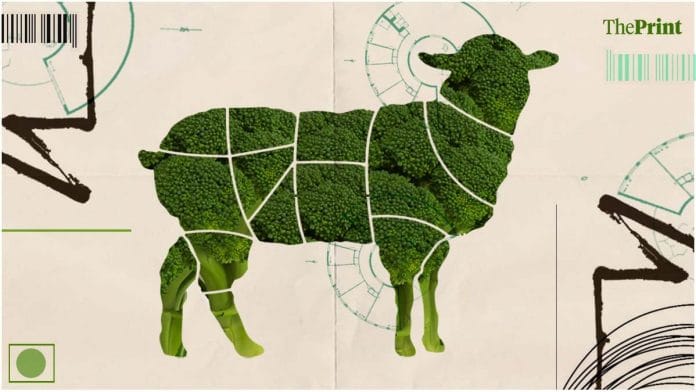In a country like India where pure milk and cheap vegetables are not easily available in sufficient quantities, any campaign against meat-eating is not desirable. In Delhi, pure milk is sold at the rate of As. 12 a seer. Nothing to say about the views of Jawaharlal Nehru, in whose opinion milk is not a “must” maintaining normal health.
While addressing Congress MPs recently in the Capital, the Prime Minister quoted a Chinese scientist as having attributed the resistance of the Chinese people to diseases to their avoiding milk. In these circumstances man again finds himself between the devil and the deep sea. What to eat and what to avoid seems to be the most pricking question which does not appear to have been solved as yet.
Pills of happiness
Much has been said against non-vegetarian foods. Dr. Rajendra Prasad, President of the Indian Republic, says vegetarianism can save humanity from the devastations of the nuclear weapons. Madame Clarence Gasque, President, World Vegetarian Congress, charges meat for causing cancer and other diseases to the Americans. Her advice to the Indian people is, “If you do not want diseases from the West to come to you, do not change your vegetarian food habits.”
Good words and a nice suggestion indeed. But what about the bad effects of the “Pills of Happiness” widely used by the people of America to get relief from mental worries and nervous tensions. It is quite possible that the mounting number of diseases in the U.S.A. may be due to her present social, political and environmental conditions which are quite different from ours.
To say that man by nature is vegetarian is baseless and misguiding. Primitive man lived by hunting, and man by nature is violent, which is why wars have not yet ended. The way of living of the various tribes in India and other parts of the world is enough to support this view.
Hitler was a vegetarian
Moreover, one may also agree with the argument of Hakim Abdul Hameed of Delhi, who has discussed the subject of vegetarianism in the editorial columns of his fortnightly news-magazine “Hamdard”, an organ of the indigenous systems of medicine.
While quoting three staunch vegetarians from Cabel to Hitler and Godse, Hakim Hameed asks in his editorial, “Is it possible to popularise vegetarianism without studying the various aspects of man’s life such as his physiological system, individual temperament, geographical conditions, economic problems, social environment etc.?” Cabel, the eldest vegetarian son of Adam, killed his non-vegetarian brother Abel in a love affair. Hitler, the staunch vegetarian of his time, and whose cook also used to be a vegetarian, launched the Second World War. And vegetarian Godse assassinated vegetarian Mahatma Gandhi.
“Suppose if the philosophy of the vegetarians is accepted in its present form, various new animal problems will arise along with the present food difficulties of the human beings,” Hakim Abdul Hameed adds in his article under reference.
Of the ten basic rules of Buddhism, the first is “I accept the precept to refrain from harming living beings”. But there are historical evidences that it did not involve complete vegetarianism, though it came to do so in many Buddhist communities. A monk might eat meat if the animal providing it was not specially killed for his benefit.
When a Chinese traveller Fa-hsien visited India in the 5th century he reported that no respectable person ate meat the consumption of which was confined to low castes. The growth of vegetarianism in India was of course linked with the doctrine of non-violence, which was already old at the time of Fa-hsien.
Meat-eating and drinking not against Indian tradition
But the Arthashastra accepts meat-eating as quite normal and lays down rules for the management of slaughter-houses and the maintenance of the purity of meat. Medical texts even of ancient India go so far as to recommend the use of both meat and alcohol in moderation and do not forbid the eating of beef. It is doubtful if complete vegetarianism has ever been universal in any part of India. With the prohibition of meat-eating some religious texts included that of eating garlic and onions.
But the Russian scientists have developed a science of “Onionology” for the treatment of the decayed gums and other diseases of the mouth and stomach.
For such a controversial subject like vegetarianism, it will be very difficult to determine the category of fish and eggs. Because fish has life, it has bones, sinews and blood. To eat fish one has to catch and kill it. And also, an egg is intended to be a chicken and those who eat it, do really eat chickens in the embryo. It is an act of infanticide.
If you leave eating fish and egg, you are deprived of two most potent foods. Eighty per cent of an egg is said to be protein. Fish provides you with Vitamins A and D. And it has been declared by some American scientists recently that cod-liver oil is specific for T.B.
Vegetarianism — a fad
Furthermore, animal protein is generally accepted to be more valuable than vegetable protein for growth because the creation of new tissues requires abundant supplies of essential amino acids, which are more readily available and in appropriate quantities and groupings in the animal product. The truth is that much depends upon the appropriate mixing of animal and vegetable proteins. Investigations have shown that milk and eggs, alone of the animal protein foods, exceed in value the mixed proteins found in normal dietaries.
And if man is unfortunately persuaded to avoid non-vegetarian foods like fish, eggs, meat etc. nature knows better what will happen to him.
This essay is part of a series from the Indian Liberals archive, a project of the Centre for Civil Society. It is taken from The Indian Libertarian journal, with the essay originally titled: “Hitlerite Vegetarianism,” published on 1 January 1953. The original version can be accessed here.






